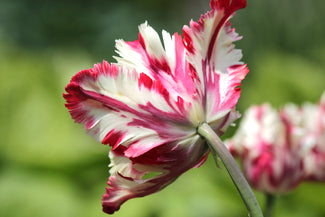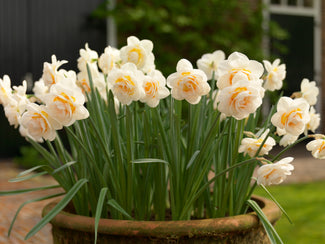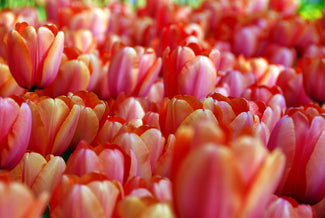Frequently Asked Questions
FIND YOUR ANSWERS BELOW
What is the best time to plant Spring-flowering bulbs?
In general, flower bulbs can best be planted when the soil temperature is lower than 9 Celsius degrees. Depending on the outside temperature the bulbs can therefore be planted from September to December (or even longer if the frost holds out).
I just received my bulbs and the weather is still warm - what should I do?
Our bulbs start shipping out by September. If the temperatures have not yet cooled in your area, it may be best to store your bulbs until they do. Keep them in a cool, dark, dry place until the conditions are favourable. Conditions are best about 6 weeks before the soil freezes, when day temperatures begin to drop to 12 Celcius. This usually happens when night-time temperatures are dipping to 10 Celsius or cooler consistently. Avoid storing them in the fridge - it is too moist and some foods can be affected.
Do tulips come back every year?
Tulips are not perennials. They can come back some years, but most don't, and if they do return every year the energy of the bulb diminishes so the flower becomes smaller and smaller. If you are looking for bulbs that are easy to naturalise then we recommend daffodils, muscari, allium, snowdrops or crocus.
Having said that, Darwin Hybrid tulips are the strongest tulips in the industry, and these tulip varieties will come back for some years. We have an interesting blog post about these Darwin Hybrid Tulips as well written by Michael King.
View our complete darwin tulip assortment.
As anyone in the UK knows, the only thing you can say about the weather is that it is unpredictable. So, if my bulbs have started growing and we get a sudden cold snap after some warm weather, what do I need to do?
Nothing! Sit tight - there is no need to do anything. Bulbs are far tougher than they look and are designed to take what nature throws at them. You don’t have to cover your bulb shoots with extra weather protection as a cold snap won’t cause any lasting damage to young shoots or buds. In fact, many early-Spring blooms such as crocuses, Winter aconite and snowdrops make their first appearance on hard, snowy ground. Unseasonably warm temperatures may cause some bulbs to bloom slightly earlier, but are unlikely to cause any damage.
If I find a bag of bulbs at the end of Winter that are lurking in the back of a cupboard, or I come across some bulbs I didn’t get around to planting, should I wait till next year to plant them?
No! If the bulbs are still in good condition – i.e. firm and in good shape - plant them straight away. Bulbs that are left in storage will only dry up as they age, so there is no point leaving them to deteriorate. Bulbs are little powerpacks that will do their utmost to grow, regardless of how late in the season they are planted, so you stand a better chance of success even by planting them late in the season, than if you waited another year. An alternative to outdoor planting is to use them as forced bulbs for indoor use, by chilling them in the fridge.
What is meant by "naturalising"?
Naturalising refers to the ability of a bulb to multiply, or produce more storage organs under the surface of the soil. If a bulb is said to "naturalise", this means that it will spread over time and therefore, should be given ample space to do so and possibly be divided at some point in the future to increase the number of blooms.


